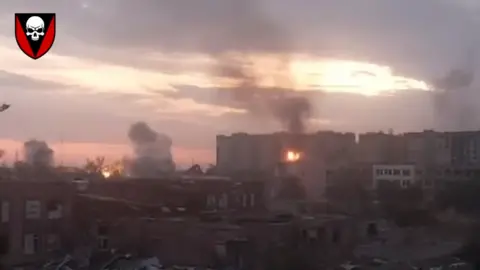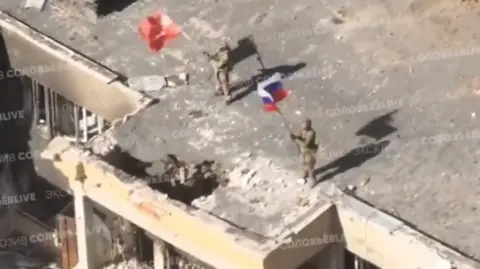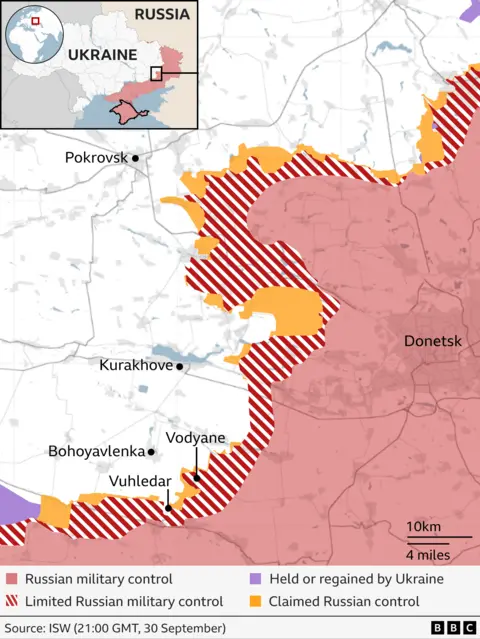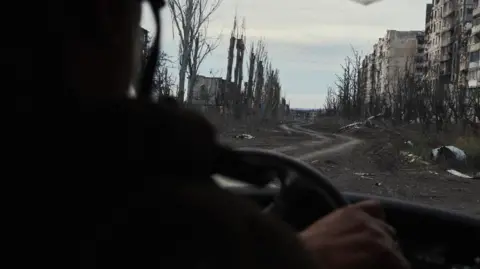
Russian forces are now reportedly in near-total control of Vuhledar, a city in eastern Ukraine that Ukrainian troops have defended since the onset of Moscow’s full-scale invasion. Analysts from DeepState, a prominent group tracking the Ukrainian conflict, have indicated that Russian troops have captured the city, although there has not been any official confirmation yet.
For over two years, Russia has attempted to seize Vuhledar in its broader objective to advance northward toward key regional transport hubs such as Kurakhove and Pokrovsk. Pro-Kremlin military bloggers have posted videos showing Russian soldiers raising flags atop buildings in Vuhledar, further supporting claims of Russian success.
On Tuesday, officials from Donetsk confirmed that Russian forces had almost reached the city center. However, some reports suggest Ukrainian forces are still clinging to control of a few districts. Two soldiers from Ukraine’s 72nd Brigade, who managed to leave the city before the final assault, told the BBC that Ukrainian troops have withdrawn from Vuhledar. One anonymous Ukrainian machine-gunner revealed that troops had to flee the city on foot over the past several days, as it had become impossible to evacuate them otherwise. According to the machine-gunner and another soldier, Roman, many were wounded or killed by Russian artillery and drones during their desperate escape attempts, and many more are still missing.

Since the beginning of Russia’s full-scale invasion in February 2022, Vuhledar has been the focus of numerous Russian military efforts. Though Russian attempts to capture the city had previously failed, they recently shifted their tactics. Rather than frontal assaults, Russian forces began flanking the city in a bid to encircle it. Last month, they successfully captured the villages of Prechystivka to the west and Vodyane to the east, which allowed them to close in on Vuhledar from multiple directions.
Russia’s significant advantage in troop numbers and weapons—estimated by Ukrainian soldiers to be a seven-to-one ratio—eventually enabled the Russian army to break through Ukrainian defenses along the city’s flanks. The critical blow came when Russian forces cut off the last remaining route out of the city, a road leading from Vuhledar to Bohoyavlenka. Russian artillery and kamikaze drones targeted anyone attempting to use the road, which made evacuation impossible. Roman recounted how Ukrainian forces tried to send supplies and evacuate wounded soldiers but had to stop as they kept losing vehicles.
By Tuesday, only about 100 civilians remained in Vuhledar, according to Donetsk regional head Vadym Filashkin. This is in stark contrast to the pre-war population of 14,000. While all children had been evacuated, it has become increasingly difficult to reach the remaining civilians due to the intensifying battle.

The situation for Ukrainian troops defending Vuhledar became critical when Russian forces entered the city, prompting Ukrainian units to begin retreating—many without formal orders. According to the machine-gunner, the withdrawal was chaotic due to communication breakdowns, leaving some Ukrainian troops disoriented under heavy fire. Radios were down, and soldiers had to make snap decisions about whether to stay and fight or retreat, often choosing the latter. Ukrainian defense lines were ravaged by Russian airstrikes, thermobaric weapons, drones, and rocket launchers, making holding their positions untenable.
While withdrawing became necessary, escaping a nearly encircled city posed severe risks. Ukrainian soldiers could only attempt to flee at night, navigating minefields to avoid Russian-monitored roads. Previously, evacuation vehicles had been able to move in under the cover of darkness, but once Russian forces reached the city center, escape became possible only on foot. Those who managed to flee were left physically and emotionally drained, expressing frustration that their commanders did not order a retreat earlier. Some soldiers believed it had been apparent for some time that Vuhledar could not be defended much longer.

The lack of an official withdrawal order has caused bitterness among the troops. Roman, the machine-gunner, speculated that higher military leadership or political pressure might have played a role in the decision to hold Vuhledar “with our blood until the very end.”
Military officials from Ukraine’s 72nd Brigade and operational command have declined to comment on the situation. Additionally, in recent daily briefings, Ukraine’s General Staff has not mentioned Vuhledar directly. On Wednesday morning, the General Staff reported only that Russian forces had launched unsuccessful attacks on Ukrainian positions in the direction of Bohoyavlenka, without addressing the critical developments in Vuhledar.





